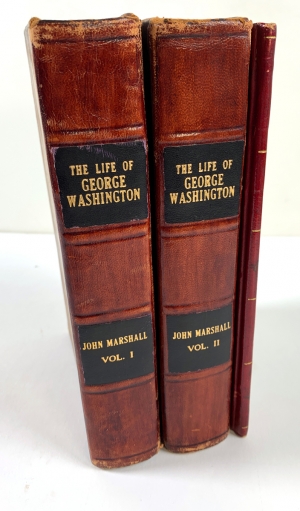|
Unique Inscribed Set of John Marshall’s Life of George Washington, With Joseph Story Letter to the Daughter of the Late Associate Justice Henry Brockholst Livingston, Conveying Marshall’s Thanks and Noting That He Will Be Sending to Her These Very Books |
Click to enlarge:

Select an image:
JOHN MARSHALL.
Inscribed books, signed “The Author.” The Life of George Washington, Commander in Chief of the American Forces, During the War which Established the Independence of his Country, and First President of the United States, Compiled under the Inspection of the Honourable Bushrod Washington, From Original Papers Bequeathed to him by his Deceased Relative, 2 vols. Philadelphia: Carey & Lea, 1832. 2nd Edition, Revised and Corrected by the Author. Volumes I – II bound in red quarter leather spine and brown leather, each inscribed and signed, “For Mrs. Ledyard with the profound respect of The Author.” John Marshall’s magisterial biography of George Washington was originally a five-volume set. This 1832 publication was revised by Marshall and issued in two volumes, with a companion volume of Revolutionary War maps: Atlas to Marshall’s Life of Washington, Philadelphia: J. Crissy, [1832], 10 hand-colored maps, bound in red quarter leather with original blue boards. With scarce printed errata for Volume I laid in, and manuscript errata for Vol II. The letter requires conservation.
Inventory #26161
Price: $27,500
[Laid in:]
Joseph Story letter alerting Ledyard that he will be sending the above books on John Marshall’s behalf, and also promising to send a copy of Story’s own Commentaries on the Constitution, “now [and still] used at Harvard College.”
JOSEPH STORY, Autograph Letter Signed, to Susan French Livingston Ledyard, June 1, 1833, Cambridge, Massachusetts. 2 pp.
Complete Transcript
Cambridge June 1, 1833.
My dear Madam
I sent your present of Alison’s Sermons to the Chief Justice after I had had it neatly bound. I have lately received a letter from him, in which he desires me to thank you in “my best manner” (as he is pleased to phrase it) for this very acceptable mark of your kindness. Now, I am sure I need say no more to you on such a subject, than that I am sure there is [no] human being from whom such a present would have been more welcome than from you. I almost envy you the satisfaction of knowing it, if I could envy one, who so richly deserves it. But the more substantial part of my letter is to inform you; that he has sent on to me for you a copy of his last Edition of his Life of Washington, & in the fly leaf there is an [?]voucher of the fact. I am sure you will treasure up such a work from such a hand with uncommon care and delight.”
with uncommon care & delight. <2> I shall send it to you by the first opportunity, I can find; & at the same time I shall send for Henry’s acceptance a copy of the Abridgment of my Commentaries on the Constitution now used as a text Book in Harvard College.
Pray give my kind regard to him, & believe as ever affectionately your friend
Joseph Story
Mrs. Susan Ledyard
P.S. Mrs. Story desires her Love to you. We look forward with great pleasure to the fulfilment of your promised visit this summer. JS
John Marshall (1755-1835) served as a minister in the XYZ Affair, and was afterwards appointed by John Adams to Secretary of State (1800-1801). The next year, Adams nominated Marshall Chief Justice of the Supreme Court (1801-1835). He was the only man to have held these positions simultaneously, serving between February 4, 1801 and March 3, 1801 in both capacities. Marshall did much to shape constitutional interpretation regarding private property and the ultimate supremacy of the Federal government over state governments, and he firmly established the court as the final arbiter of constitutional disputes.
Joseph Story (1779-1845) graduated from Harvard College in 1798, and gained admission to the bar in 1801.He served in the Massachusetts House of Representatives and the U.S. House of Representatives In November, 1811, President James Madison made him the youngest person ever nominated to the Supreme Court. In his 32 years as an Associate Justice, he played a pivotal role in supporting Chief Justice John Marshall and the Court’s asserting of Constitutional authority over state courts and legislatures. Story was also one of the most successful American authors of the first half of the nineteenth-century, with his legal treatises and commentaries earning him more than his salary on the Supreme Court. His Commentaries on the Constitution is still taught today.
Susan French Livingston Ledyard (1789-1864) was a granddaughter of New Jersey Governor and Constitution signer William Livingston (1723-1790) and the daughter of U.S. Supreme Court Justice Henry Brockholst Livingston (1757-1823). She married prominent New York attorney Benjamin Ledyard (1779-1812). Their son, Henry Brokholst Ledyard (1812-1880), whom Story references in this letter, graduated from Columbia College in 1830 and began practicing law in New York.
Alison’s Sermon’s is likely Sermons, Chiefly on Particular Occasions, by Archibald Alison, published in 1815.